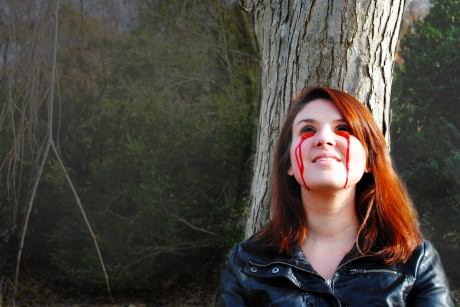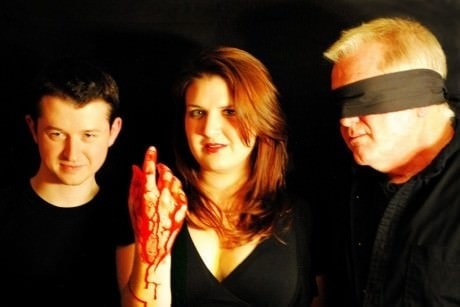Tiresias Speaks Again at Forum Theater
The opening scene of We Tiresias poses what appears to be a simple question: What if you could text a couple of your former selves and meet them for a drink? What would you talk about? What would you wear? It goes without saying that most of us would do it if we could, just as most of us revisit places where we used to live to look for remnants. Most of us can think of former selves that we still like, and we suppose their company would be a pleasure for a while.

Most of us are not Tiresias.
One of many things to admire in this play by young Stephen Spotswood is its assertion — its assumption — that classic characters can speak to modern audiences if you get them together for a drink.
Tiresias isn’t like the rest of us in many ways: he inhabits a story realm where gods muck around with men and women, who are gods without the magic power; he can see what’s going to happen in the future, everybody’s future but his own; he was a woman during middle age; and he pulled his own eyes out so he wouldn’t have to see the future anymore. That was a mistake, different in degree perhaps from my mistakes, but not in kind.
“Once upon a time,” the oldest version of Tiresias begins, but then he breaks off: “If only it were only once, not over and over…” An entire lifetime of foretelling other people’s stupid mistakes while plunging headlong blind into his own. Is that plight confined to prophets, or to men of old?
Tiresias is probably best known as the seer who foretells the fates of Oedipus and Creon in Oedipus Tyrannus and Antigone, but he had a substantial backstory in Greek mythology before Sophocles picked him up, and much of that backstory sounds surprisingly modern. There are two stories explaining his gift and his curse. The first is Puritanical: one day he saw Athena swimming naked, and she blinded him so he couldn’t go around peeking at nude girls anymore, but she also gave him the capacity to understand the language of birds, who apparently talk about the future all the time.
The second story sounds more like a tale for our time: one day in the woods he came upon a pair of copulating snakes, and he hit them with a stick, offended perhaps by their ardor, and that made the goddess Hera mad. She liked sex. She turned Tiresias into a woman, ostensibly to punish him, but maybe her ulterior motive was to change his mind about sex by letting him experience it as a woman. Years later, his manhood restored, Tiresias was asked to settle a dispute: Hera wanted Zeus to believe that men derived the better part of sexual pleasure, just as they derived the better part of everything else, but he thought she might be pulling something like his leg, so he asked Tiresias, who had swung both ways, to weigh in. Women, said Tiresias, like it ten times more than men. That made Hera so mad that she blinded him.
In Spotswood’s version, (which was awarded Best Drama at the 2012 Capital Fringe Festival) Tiresias is castrated or womanized as punishment for seducing one of Hera’s apprentices — it’s not clear in either version why womanhood should be punishment — and she (Tiresias) pulls out her own eyes after bandits kill her lover and abduct her infant daughter. At that point Lighting Designer Kevin Boyce blasts the audience with light that blinds us for a moment.
Melissa Marie Hmelnicky plays Tiresias’s woman-self, in tight jeans and a tee shirt bearing the insignia of Tom Petty and the Heartbreakers — my wife wondered what to think about her costume. She often acts as the moderator between young Tiresias (Chris Stinson), and the Old Man, (Will Aitkin). Since Spotswood, the playwright, is young and male himself, it’s not surprising that the young Tiresias is fuller and more convincing than either his female analog or the old Tiresias, whose cynicism lacks the woundedness that every cynic hopes to hide.
“No matter the life, everyone feels they’ve been cheated,” the old man says at one point. “They see how little time is left before them and think they’ve been wronged. But even the most bitter has a secret place in his heart where he keeps the secret hope that all this is a dream, and what he really wants is for someone to whisper to him that that’s true.”
“Would you do it?” I asked earlier, but the better question, presuming most of us would answer yes, is why would you do it? Or why has Spotswood done it?
In his review of the play’s premier at the DC Fringe Festival in July of last year, Washington Post critic Peter Marks suggested that, “we might be more fully transported by Tiresias’ story if the character confided more about why he’s chosen this moment to tell it.” The current production reflects changes Spotswood made after that first run.
“When revising for the remount,” he told DC Theater Arts Editor Joel Markowitz, “I took the opportunity to address certain areas of the script that I found lacking. Mainly the urgency in the storytelling — why are these characters telling this tale at this moment?” That question persists in this viewer’s mind; I see it especially in the play’s uncertainty about where to start and how to end.

Though I don’t yet see why Tiresias wants to tell his story, I can think of a lot of reasons for Spotswood to tell it, not the least of which is to cast himself in the tradition of poets and playwrights who have reclaimed old wine by pouring it into new bottles, bottles which the rest of us would not have thought to use, and thus reminding us that “the past is never dead,” as Faulkner said; it isn’t even past.
Most of us are not Tiresias, and we’re not Tom Petty either, but when you listen past the gender switching and the eyeball plucking and the rock-stardom, we sound less different than we sound the same. Spotswood understands that. I look forward to his next play.
Running Time: 70 minutes, with no intermission.
We, Tiresias plays through January 13, 2013 at Forum Theatre at Round House Theatre Silver Spring – 8641 Colesville Road, in Silver Spring, MD. For tickets, call the Round House Theatre box office (240-644-1100), or purchase them online.




